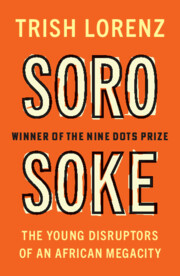Book contents
- Soro Soke
- Soro Soke
- Copyright page
- Contents
- Figures and Illustrations
- About the Nine Dots Prize
- 1 The Soro Soke Generation
- 2 The New York of Nigeria
- Speaking Out: Chekwube Okonkwo on Expressing African Identity
- 3 Cultural Capital
- Speaking Out: Osinachi on Art and Nigerian Identity
- Speaking Out: Priscilla Eke on Feminism
- 4 Challenging Norms
- Speaking Out: Uyaiedu Ipke-Etim on Facing Homophobia
- Speaking Out: Michael Elégbèdé on the Diaspora
- 5 Japá
- Speaking Out: Davies Okeowo on Entrepreneurship
- 6 Entrepreneurs with a Mission
- 7 The New Oil
- Speaking Out: Rinu Oduala on the #endSARS Protests
- 8 The Hashtag Generation
- Speaking Out: Princess Obiajulu Ugwu on Standing for Election
- Speaking Out: Fortunes Oronkwo on the Monetisation of Politics
- 9 Contesting for Power
- 10 We’re in This Together
- Acknowledgements
- Notes
- Soro Soke
- Soro Soke
- Copyright page
- Contents
- Figures and Illustrations
- About the Nine Dots Prize
- 1 The Soro Soke Generation
- 2 The New York of Nigeria
- Speaking Out: Chekwube Okonkwo on Expressing African Identity
- 3 Cultural Capital
- Speaking Out: Osinachi on Art and Nigerian Identity
- Speaking Out: Priscilla Eke on Feminism
- 4 Challenging Norms
- Speaking Out: Uyaiedu Ipke-Etim on Facing Homophobia
- Speaking Out: Michael Elégbèdé on the Diaspora
- 5 Japá
- Speaking Out: Davies Okeowo on Entrepreneurship
- 6 Entrepreneurs with a Mission
- 7 The New Oil
- Speaking Out: Rinu Oduala on the #endSARS Protests
- 8 The Hashtag Generation
- Speaking Out: Princess Obiajulu Ugwu on Standing for Election
- Speaking Out: Fortunes Oronkwo on the Monetisation of Politics
- 9 Contesting for Power
- 10 We’re in This Together
- Acknowledgements
- Notes
Summary
Africa may be home to the youngest population on earth, but its leaders are among the oldest; many are in their 80s. Most Africans, and especially young Africans, think their governments are doing a bad job at addressing the needs of youth, but young people struggle to gain access to power because ruling elites remain entrenched for decades. Nigerian president Muhammadu Buhari seems woefully out of touch with his young electorate: in 2018 he accused young Nigerians of being lazy and uneducated. Young people are responding. In the Nigerian capital, Abuja, a thriving civic society led by young people encompasses everything from promoting good governance and increased transparency to increasing young voter registration and mentoring the leaders of tomorrow. But cultural norms and systemic barriers make it difficult for young people to be elected and monetisation of elections is a further issue: the cost of nomination forms for office is high and vote buying is endemic. The upcoming 2023 elections are likely to be a key moment for young people in Nigeria, when it will become visible if the impetus of recent social movements can be translated into an electoral force.
Keywords
- Type
- Chapter
- Information
- Soro SokeThe Young Disruptors of an African Megacity, pp. 121 - 137Publisher: Cambridge University PressPrint publication year: 2022
- Creative Commons
- This content is Open Access and distributed under the terms of the Creative Commons Attribution licence CC-BY-NC-ND 4.0 https://creativecommons.org/cclicenses/

